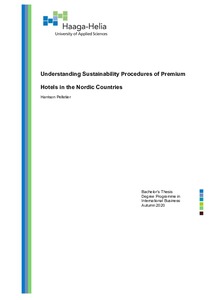Understanding Sustainability Procedures of Premium Hotels in the Nordic Countries
Pelletier, Harrison Matthew (2020)
Pelletier, Harrison Matthew
2020
Julkaisun pysyvä osoite on
https://urn.fi/URN:NBN:fi:amk-2020120225753
https://urn.fi/URN:NBN:fi:amk-2020120225753
Tiivistelmä
The primary purpose of this thesis was to investigate how large chains in the hospitality sector build sustainable supply chains. This was conducted by reviewing academic texts and journals written by professionals in areas such as corporate social responsibility, waste management, and environmental awareness. A comparative analysis based on two of the largest condenders in the Nordic hospitality industry Nordic Choice and Scandic group, was carried out to investigate how sustainable supply chains are constructed and maintained.
The goal was to obtain knowledge on sustainable development and implementation in a dynmanic, constantly changing setting, and to gain an understanding of how these principles are monitored and reviewed for a higher grade of corporate transparency. The influence of the coronavirus pandemic on the hospitality industry’s ability to remain sustainable and profitable was also considered and the situation assessed. The main research question was: “How do large companies in the hospitality industry create and conduct sustainability initiatives?”
The framework of the thesis focuses on corporate social responsibility, energy and waste management, transparency of rules and regulations, the significance of strong corporate governance, and how the case company, Nordic Choice Hotels, and its largest competitor, Scandic Group, have taken these aspects into account in their supply chain plan and daily protocols.The thesis’ structure was primarily qualitative, which allowed the author to pull from sources that give credibility to the results produced. The results themselves focus on concerns of the degree to which the industry will work to retain its sustainability should COVID-19 persist for an extended amount of time. While the initial goal was to suggest solutions to assist the industry, it became increasingly apparent that only cryptic assumptions about the future can be made until the pandemic and its nature is better understood.
Sustainability and corporate social responsibility have become major areas of focus for every industry, and especially for the hospitality industry. Guests want to know more about how their hoiday directly affects the wellbeing of staff that work at the hotels, the farmers and animals that provide the food that they eat, and the end destination for waste that has a big impact on our planet at large. In light of this, top hospitality management must ensure an explicit level of transparency to stakeholders as well as shareholders in the company.
The goal was to obtain knowledge on sustainable development and implementation in a dynmanic, constantly changing setting, and to gain an understanding of how these principles are monitored and reviewed for a higher grade of corporate transparency. The influence of the coronavirus pandemic on the hospitality industry’s ability to remain sustainable and profitable was also considered and the situation assessed. The main research question was: “How do large companies in the hospitality industry create and conduct sustainability initiatives?”
The framework of the thesis focuses on corporate social responsibility, energy and waste management, transparency of rules and regulations, the significance of strong corporate governance, and how the case company, Nordic Choice Hotels, and its largest competitor, Scandic Group, have taken these aspects into account in their supply chain plan and daily protocols.The thesis’ structure was primarily qualitative, which allowed the author to pull from sources that give credibility to the results produced. The results themselves focus on concerns of the degree to which the industry will work to retain its sustainability should COVID-19 persist for an extended amount of time. While the initial goal was to suggest solutions to assist the industry, it became increasingly apparent that only cryptic assumptions about the future can be made until the pandemic and its nature is better understood.
Sustainability and corporate social responsibility have become major areas of focus for every industry, and especially for the hospitality industry. Guests want to know more about how their hoiday directly affects the wellbeing of staff that work at the hotels, the farmers and animals that provide the food that they eat, and the end destination for waste that has a big impact on our planet at large. In light of this, top hospitality management must ensure an explicit level of transparency to stakeholders as well as shareholders in the company.
